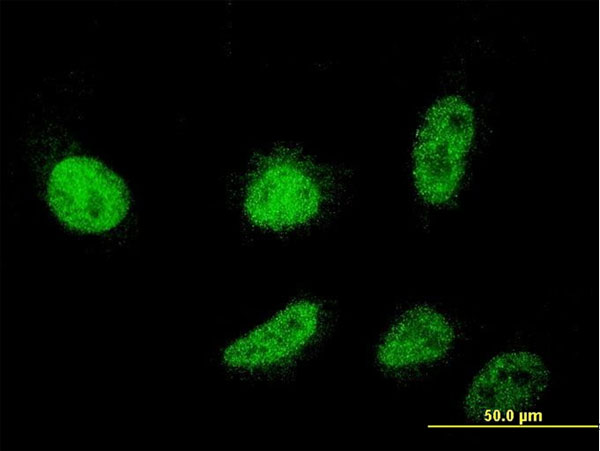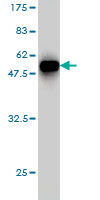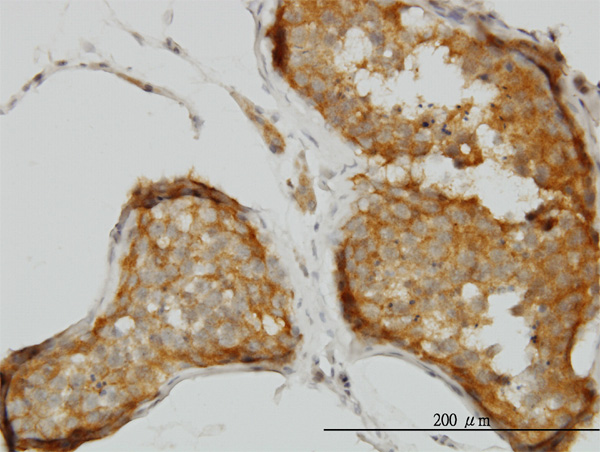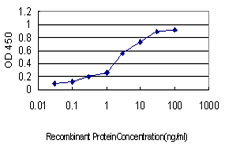PIPPIN Antibody (monoclonal) (M01)
Mouse monoclonal antibody raised against a full length recombinant PIPPIN.
- SPECIFICATION
- CITATIONS
- PROTOCOLS
- BACKGROUND

Application
| WB, IHC, IF, E |
|---|---|
| Primary Accession | Q9Y534 |
| Other Accession | BC067113 |
| Reactivity | Human |
| Host | mouse |
| Clonality | Monoclonal |
| Isotype | IgG1 Kappa |
| Clone Names | 2H8 |
| Calculated MW | 16786 Da |
| Gene ID | 27254 |
|---|---|
| Other Names | Cold shock domain-containing protein C2, RNA-binding protein PIPPin, CSDC2, PIPPIN |
| Target/Specificity | PIPPIN (AAH67113, 1 a.a. ~ 153 a.a) full-length recombinant protein with GST tag. MW of the GST tag alone is 26 KDa. |
| Dilution | WB~~1:500~1000 IHC~~1:100~500 IF~~1:50~200 E~~N/A |
| Format | Clear, colorless solution in phosphate buffered saline, pH 7.2 . |
| Storage | Store at -20°C or lower. Aliquot to avoid repeated freezing and thawing. |
| Precautions | PIPPIN Antibody (monoclonal) (M01) is for research use only and not for use in diagnostic or therapeutic procedures. |

Thousands of laboratories across the world have published research that depended on the performance of antibodies from Abcepta to advance their research. Check out links to articles that cite our products in major peer-reviewed journals, organized by research category.
info@abcepta.com, and receive a free "I Love Antibodies" mug.
Provided below are standard protocols that you may find useful for product applications.
References
Toward a confocal subcellular atlas of the human proteome. Barbe L, et al. Mol Cell Proteomics, 2008 Mar. PMID 18029348.Systematic identification of SH3 domain-mediated human protein-protein interactions by peptide array target screening. Wu C, et al. Proteomics, 2007 Jun. PMID 17474147.Diversification of transcriptional modulation: large-scale identification and characterization of putative alternative promoters of human genes. Kimura K, et al. Genome Res, 2006 Jan. PMID 16344560.The status, quality, and expansion of the NIH full-length cDNA project: the Mammalian Gene Collection (MGC). Gerhard DS, et al. Genome Res, 2004 Oct. PMID 15489334.A genome annotation-driven approach to cloning the human ORFeome. Collins JE, et al. Genome Biol, 2004. PMID 15461802.
If you have used an Abcepta product and would like to share how it has performed, please click on the "Submit Review" button and provide the requested information. Our staff will examine and post your review and contact you if needed.
If you have any additional inquiries please email technical services at tech@abcepta.com.













 Foundational characteristics of cancer include proliferation, angiogenesis, migration, evasion of apoptosis, and cellular immortality. Find key markers for these cellular processes and antibodies to detect them.
Foundational characteristics of cancer include proliferation, angiogenesis, migration, evasion of apoptosis, and cellular immortality. Find key markers for these cellular processes and antibodies to detect them. The SUMOplot™ Analysis Program predicts and scores sumoylation sites in your protein. SUMOylation is a post-translational modification involved in various cellular processes, such as nuclear-cytosolic transport, transcriptional regulation, apoptosis, protein stability, response to stress, and progression through the cell cycle.
The SUMOplot™ Analysis Program predicts and scores sumoylation sites in your protein. SUMOylation is a post-translational modification involved in various cellular processes, such as nuclear-cytosolic transport, transcriptional regulation, apoptosis, protein stability, response to stress, and progression through the cell cycle. The Autophagy Receptor Motif Plotter predicts and scores autophagy receptor binding sites in your protein. Identifying proteins connected to this pathway is critical to understanding the role of autophagy in physiological as well as pathological processes such as development, differentiation, neurodegenerative diseases, stress, infection, and cancer.
The Autophagy Receptor Motif Plotter predicts and scores autophagy receptor binding sites in your protein. Identifying proteins connected to this pathway is critical to understanding the role of autophagy in physiological as well as pathological processes such as development, differentiation, neurodegenerative diseases, stress, infection, and cancer.





